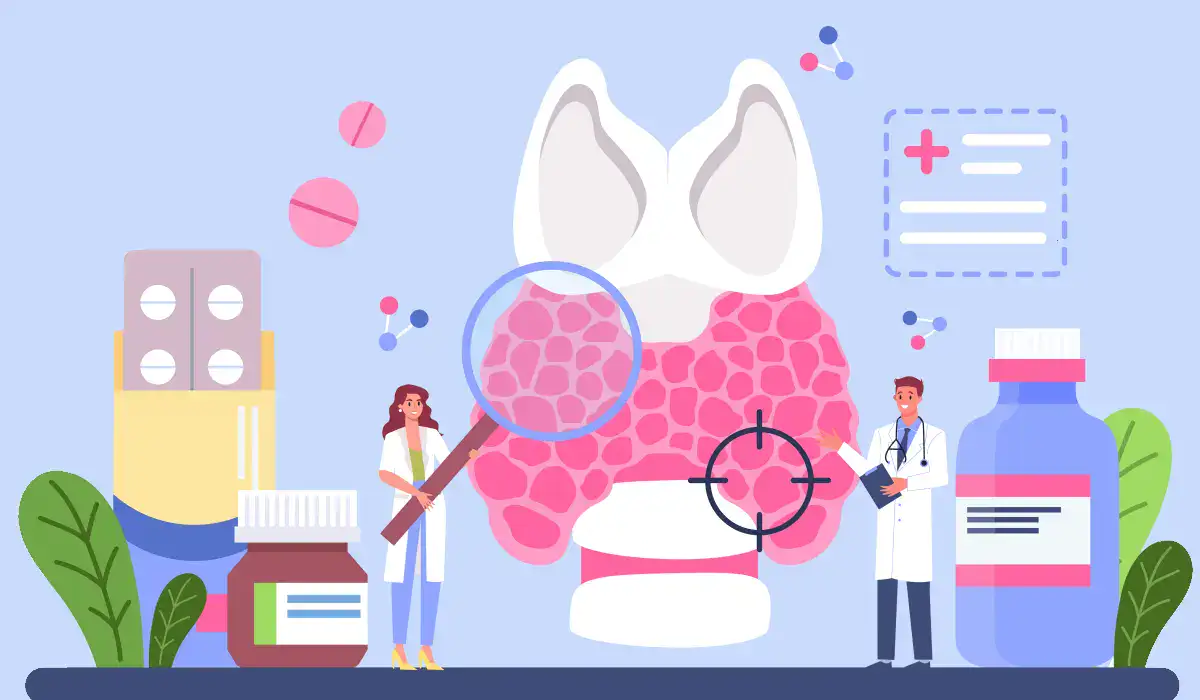Observed every year on the 25th of May, World Thyroid Day is a global event aimed at educating and heightening consciousness about thyroid-related disorders and diseases. This important day puts the spotlight on vital issues like the significance of maintaining thyroid health and the effective prevention and treatment options for thyroid problems.
The main goal of this occasion is to raise public awareness about the significant implications of thyroid diseases, which affects millions of lives around the world, from hyperthyroidism to thyroid cancer.
History of World Thyroid Day
The annual World Thyroid Day, celebrated on May 25, was first initiated in 2007 by prominent organizations like the American Thyroid Association, Latin American Thyroid Society, European Thyroid Association, and the Asia Oceania Thyroid Association.
The goal behind the creation of this day was to emphasize the significance of awareness about thyroid diseases. These diseases affect a significant portion of Earth’s population, yet a considerable percentage of cases remain unreported or undiagnosed owing to a lack of widespread consciousness regarding these conditions.
World Thyroid Day was established due to the large number of individuals, over 200 million globally, impacted by thyroid disease. The condition tends to occur more frequently in women and the rate of incidence escalates with advancing age.
The primary aim of World Thyroid Day is to enhance global understanding of thyroid health. The events of the day aim to foster an environment that encourages preventative measures, early detection, and stresses the importance of managing the condition suitably once diagnosed. Every year, various events and activities are held across the world, engaging local and international audiences.
Each year, World Thyroid Day unites people worldwide and provide them with the tools and knowledge necessary to take control of their wellbeing. Through the attention generated by this day, more people are motivated to seek help if they suspect they might be experiencing symptoms related to thyroid disease.
World Thyroid Day Timeline
First Recorded Case
Ancient Chinese medicine records describe symptoms of goiter, a condition typically caused by a malfunctioning thyroid that causes the neck to swell.
Recognition by Hippocrates
The Greek physician Hippocrates acknowledges the disorder but doesn't link it to the thyroid gland.
Radioiodine Therapy
The first use of radioiodine to treat hyperthyroidism (an overactive thyroid) is recorded in the United States.
TSH Test Development
Development of the thyroid-stimulating hormone (TSH) test improves the diagnosis of thyroid disorders.
Inception of World Thyroid Day
The American Thyroid Association (ATA) in cooperation with European Thyroid Association (ETA) initiated World Thyroid Day on May 25th.
Ideas to Celebrate World Thyroid Day
Thyroid awareness campaign
Arrange a local campaign to spread awareness about thyroid diseases and their prevention. It could include distributing pamphlets, setting up banners or creating a social media campaign.
Thyroid disease lecture series
Invite healthcare professionals and experts to deliver lectures regarding symptoms, risks, and treatments for thyroid diseases. This can be done in community halls, schools or virtually.
Healthy living challenge
Organize a month-long challenge that promotes healthy habits that support thyroid health such as balanced diet, regular exercise and adequate sleep. Document and share the progress online to inspire others.
Fundraising event
Host a fundraising event like a walkathon, marathon, or cycling race. The funds collected can be donated to organizations researching thyroid health or providing care for those who cannot afford treatment.
Yoga and Meditation sessions
Host free yoga and meditation sessions. Certain practices are known to aid in thyroid function and overall wellbeing.
8 Interesting Facts About Thyroid
Thyroid's Shape and Location
The thyroid gland resembles a butterfly and is located in the lower part of the neck, just below the Adam's apple. It wraps around the windpipe (trachea).
Thyroid Hormones
The thyroid gland produces three hormones: Triiodothyronine (T3), Thyroxine (T4), and Calcitonin. T3 and T4 regulate your body's temperature, metabolism, and heart rate, while Calcitonin is involved in the regulation of blood calcium levels.
Iodine and the Thyroid
The thyroid gland needs iodine to make hormones. Iodine comes from your diet, typically in foods like salt, bread, and seafood. Without sufficient iodine, the thyroid cannot produce enough hormones.
Effect of Hypothyroidism
Hypothyroidism, or an underactive thyroid, means your thyroid gland is not producing enough hormones. This condition can make people feel tired, they can gain weight and may experience depression.
Effect of Hyperthyroidism
Hyperthyroidism, or an overactive thyroid, means your thyroid gland is producing too many hormones. This can trigger symptoms like weight loss, rapid heart rate, anxiety, and tremors.
Thyroid Disorders and Women
Women are far more likely than men to have thyroid diseases. In fact, one in eight women will develop a thyroid disorder during her lifetime.
Thyroid and Mood
The thyroid gland can affect your mood. Too much thyroid hormone can make people feel anxious, restless, or irritable, while too little can cause feelings of depression and reduced energy levels.
Goiter
A goiter is an enlargement of the thyroid and can become very large. It can occur as a result of hyperthyroidism, hypothyroidism, or from an iodine deficiency.
World Thyroid Day FAQs
Next World Thyroid Day Dates
| Year | Date | Day |
|---|---|---|
| 2023 | May 25th | Thursday |
| 2024 | May 25th | Saturday |
| 2025 | May 25th | Sunday |
| 2026 | May 25th | Monday |
| 2027 | May 25th | Tuesday |
| What is the pattern? | Every May 25th | |
World Thyroid Day Word Search
- Thyroid
- Hormones
- Gland
- Iodine
- Goiter
- Metabolism
